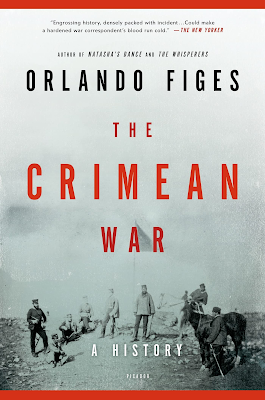"Orlando Figes's book The Crimean War: a history, based on English, Russian, French and Turkish sources, throws a new light on the Crimean War in a number of ways. It shows that the conflict was far from being a small war, but a landmark event. It was the only example of a war between Britain and Russia—and it led to enormous casualties. It also represented a stage in medical history, since most of the casualties were caused by disease. In Britain, it marked a new advance in the power of the press, which did much to fuel anti-Russian sentiment. The war was also fuelled, on both sides, by religious and nationalist sentiment—but its most important cause related to the fate of the Ottoman Empire, then in decline, and fears that its collapse could result in a dangerous power vacuum. The war still has a significance for the present day because the collapse of communism has failed to resolve the antagonism between Russia and the West. Here, the book throws an important light on the development of British and western attitudes towards Russia, many of which were shaped in the nineteenth century. The book deserves attention, both here and in Russia." - David Wedgwood Benin, "The Crimean War and its lessons for today" International Affairs, Volume 88, Issue 2, Pages 387–391, 20 March 2012.
II.
An excerpt from, "In the conflict with Ukraine, Moscow is clinging on to the excuses of the past" By Orlando Figes, El Pais, January 29, 2022:
"When the Berlin Wall came down, Putin was a KGB agent in East Germany. None of the democratic spirit of these years affected him. He experienced the collapse of the Soviet Union as a humiliation for his motherland, the “greatest geopolitical catastrophe of the 20th century,” as he later described it, in which “tens of millions” of Russians “found themselves outside the territory of Russia,” in Ukraine, the Baltic states and Kazakhstan.
In his version of this history, Russia’s chronic weakness in the 1990s was exploited by the West. The US and its North Atlantic allies acted as if the Cold War had been “won” by them, and that Russia, the “defeated” power, need not be consulted on the consequences of the Soviet collapse in regions where the Russians had historic interests and sensitivities.
. . .
The real rupture with the West came with NATO’s eastward expansion and more general Western support for the democratic “colour” revolutions in Georgia and Ukraine in 2003-4, actions raising Putin’s fears of a democratic challenge to his own dictatorship in Russia. The West’s growing influence in Russia’s borderlands also touched a deeper nerve in that country’s historical consciousness: its age-old terror of encirclement by foreign powers bent on its dismemberment."
III.
"Russia has lost an empire. They have lost a massive empire. It has been a huge trauma for Russia. Russia has an imperial nationhood. Its real empire is inside Russia. That is its problem, because it's in danger of falling apart. And that is why it is so paranoiac. Because it sees NATO's expansion on to its borders, it sees democratic movements being fostered by foreign powers within what it sees paranoiacally as its sphere of influence and it fears the influence of those within its own territory. It fears what a Ukrainian democratic revolution might mean in Moscow.
If we're going to go for the cliche of the Russian bear, that is a Russian bear who is wounded, injured, feels humiliated, but is actually trying to hold on to what it's got. And that means it will growl, and it will be aggressive, and it will swipe at those it sees endangering it, but it's not going to go on the rampage. And I don't believe we have enough evidence, at this point, to speculate about the Russian menace." - Orlando Figes (7:29 - 8:48 in the video below).
Video Title: Orlando Figes - Putin is Not Building an Empire. Source: OxfordUnion. Date Published: March 31, 2015.
The Motion: This House Believes Putin is Building an Empire
Orlando Figes is a prominent British historian and writer best known for his works on Russian history. He is Professor of History at Birkbeck College, University of London.
